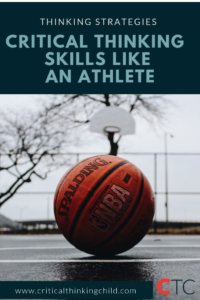Developing Critical Thinking Skills Like an Athlete
The process of developing critical thinking skills can seem frustrating for many children. It involves developing a deep understanding of the world, practicing often, and self-correcting. Just like a first time basketball player isn’t ready to play professionally, a newcomer to critical thinking strategies is only at the beginning of a continuous journey.
There are many parallels between the athlete and the critical thinker. Both are working to develop a skillset that will allow them to perform successfully, and both are following similar steps.
Step One: Understand the rules of the game
Before you can step onto the court it’s important to understand the rules of the game. If you’re a soccer player, the rules of basketball won’t help you. Similarly, you won’t get far if you start kicking the ball in the middle of a basketball game. Each game has its own set of guidelines, and before you can excel at the sport you have to understand that framework.
The same applies to the world of critical thinking skills. A critical thinker is constantly working to understand the rules that govern the world around them. Once this framework falls into place success becomes much more simple. When something new enters your child’s world, such as a new math concept, they first need to understand the principles that guide that concept. Then, as your child learns more math concepts, each one will build upon the last. Eventually the concepts become second nature, just like hand-eye coordination in a sport.
Step Two: Practice often
While knowing the rules is important, it won’t help much if that knowledge isn’t applied. Dedicated athletes spend hours practicing and developing their skills. They create a routine and, through that routine, build upon and refine their abilities.
Helping a child learn to think critically requires similar dedication. Practicing both inside and outside the classroom will help reinforce the foundation of understanding and further develop their skills. Over time, their ability to think critically will become more natural.
Step Three: Monitor and Evaluate
When you play a sport, you are constantly adjusting and tweaking your performance. Sometimes your coach may offer insight about how to improve. Other times, you are left to self-monitor. You learn to pay attention to your performance and identify areas of potential improvement.
Cognitive challenges are no different. Often, your child will have the benefit of a teacher or parent to guide and evaluate them. This is helpful, but the tool of self-monitoring is even more effective. As your child learns to evaluate their own performance they are able to adjust and adapt without outside help.
Step Four: Acknowledge Progressive Improvement
The first time an athlete touches a basketball, they probably won’t make every basket. Similarly, the first time your child tries to solve a new problem, they may not understand how to approach it.
That’s okay.
The development of critical thinking skills, like athletic skills, is an ongoing, incremental process. Improvement will happen over time, often gradually. With practice it becomes easier over time to solve new problems or make the basket.
The game is never over
Whether your child is a future basketball star, critical thinker extraordinaire, or both, they will never be finished refining their abilities. Just as athletes continue to train, critical thinkers are constantly practicing their skills.
Getting a head start and setting an early foundation is crucial, and will serve your child well into adulthood. The earlier they can begin practicing, the more time they will have to build and refine their critical thinking skills.
Pin This To Pinterest for Later




